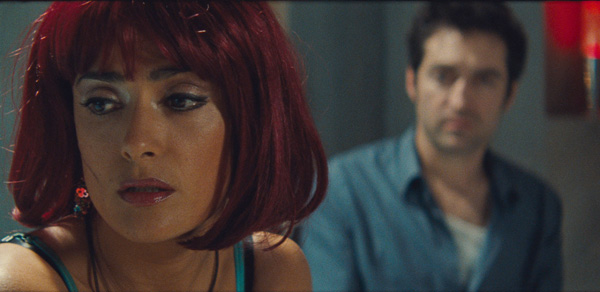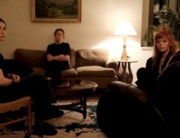
Salma Hayek and Mathieu Demy in AMERICANO (MPI Group)
Two reasons make Americano noteworthy. One, it offers the meaty role of a low-rent Tijuana prostitute for Salma Hayek to sink her teeth into, a reminder of the steeliness and hard edge she brought to Julie Taymor’s Frida Kahlo biopic, and her willingness to forgo glamor for a character with gutso. This isn’t to say she hasn’t been busy lately; she’ll appear in Oliver Stone’s Savages next month, and she recently gave her heart and soul in Spanish director Alex de la Iglesia’s caustic comedy As Luck Would Have It.
But most of all, Americano introduces the debut of writer/director Mathieu Demy, son of two eminent directors, the late Jacques Demy (of the best French musical, The Umbrellas of Cherbourg) and the still thriving Agnès Varda. It’s hard to imagine that he doesn’t feel some pressure of high expectations. Setting his lineage aside, Americano is more than a fine film, and an exceptional first film. Demy is his own director. The ambiance is unabashedly that of a French art film: understated acting, crisp but not too much on-the-nose dialogue, and an unsentimental look at the contemporary family (although these are not the exclusive domain of France, other French films like Summer Hours or A Christmas Tale come to mind). As a storyteller, le fils takes a more linear approach than his mother in her feature films. But where another director would wallow in the tawdriness of Tijuana and borrow a tracking shot or two from Touch of Evil’s trip to the border town, Demy keeps the film references in check. It’s a good call since his film serves as a tribute to his mother, in its own way.
He borrows generously from Varda’s 1981 Documenteur, in which he appeared as a boy, Martin, living in a Los Angeles bungalow apartment with his mom (Sabine Mamou). (Varda and Demy lived in LA in the early ’80s, and in her sprightly and offbeat autobiographical doc, The Beaches of Agnès, she looks back to that time with fondness.) Her little-seen film supplies the ready-made backstory for her son’s debut, and both films share the same composer, Georges Delerue. Varda co-produced her son’s film.
Nearly 30 years later, Martin (played again by the director, who remarkably looks like his father) is awaken by a phone call in the middle of the night: his mother has died in Venice, California. He doesn’t ask the caller how it happened. That just his style, not to question anything, according to his soon-to-be ex-girlfriend, Claire. (In fact, the film begins with what appears to be break-up sex.) She’s played by Chiara Mastroianni, another offspring of famous heavyweights, Catherine Deneuve and Marcello Mastroianni. Now living in Paris, Martin was sent off as a kid to live with his dad in France after his parents’ divorce. He claims to Claire that he doesn’t remember when he left; he has no memories of his California childhood. The last time he saw his mother was five years ago, but as her sole heir, he has to return to sell her condo (he’s a real-estate agent, after all) and repatriate her body.
The Los Angeles that he returns to is off-the-beaten path. The camera stays away from the famous boardwalk, preferring what used to be a lower-middle-class neighborhood of bungalows or on the freeways (the quintessential LA location). The pungent first half mirrors Martin’s cold efficiency, like when he gathers his mother’s clothes, letters, furniture, and throws them in the trash. As an actor, Demy is at his best conveying Martin’s quiet anger. He still feels rejected by his mother, especially when he finds out that she has shared a close bond with one of his childhood friends, Lola, whom he has completely forgotten about. The resentment multiplies tenfold when he reads a return-to-sender letter from his mother to Lola: knowing she is dying, she clearly states that she wants Lola to have her apartment.
Demy named the mysterious heir after the title character of his father’s 1961 noirish and romantic Lola. But whether her name is Lola or Lola Lola (as in The Blue Angel), you know she going to be a handful. Hold on to your hats and wallets. Just the mention of her name sets off a tirade from his mother’s closest friend, Linda (in a highly strung, triple espresso performance by Geraldine Chaplin, yet another daughter of film royalty—hmm). Others sheepishly look away when Martin asks about Lola. No one knows her whereabouts, only offering cryptic clues here and there.
Martin steals Linda’s Mustang ’66 and head south of the border, where Lola was last seen. And this is where maroon-wigged Hayek comes in, more than half way through, bursting through the tinsel curtains singing and stripping to a vampy version of Rufus Wainwright’s “Going to a Town,” with Dietrich-esque aloofness (okay, maybe there is a bit of Touch of Evil here). She denies she’s the girl in the photograph Martin has found among his mother’s things, and it’s left up in the air what Martin will do—fulfill his mother’s wishes or take what he think should be his. On the other hand, Lola’s direct; there’s nothing ambiguous about her motives. She’s the foil to the tongue-tied, ambivalent Martin, who keeps coming back to the bar Americano to see her, paying $100 for each conversation.
In comparison to the first part, the Mexican-set section deflates a bit. Demy’s script piles on the obstacles on the overwhelmed, dislocated Martin. His car has been stolen, along with his passport and money stashed in the trunk, and he’s missing his mother’s funeral in France. Besides being homeless and suffering a traveler’s worst nightmare, he becomes the punching bag for Lola’s pimp. At his lowest point, one of the most sensitive parts of his body is wounded (no, not there), yet the physical duress doesn’t fully inform Demy’s performance. Another actor would have taken a more penitential or masochistic approach. Instead, Demy underplays the role. Though his performance is always truthful, Martin seems more of an observer than a participant.
The pedigrees of the actors may come off as elitist, but the film is straightforward and accessible, with themes of grief, separation anxiety, and inheritance (material and otherwise) splattered on the screen. Wasn’t that what made The Descendants so popular? Nevertheless, the thank yous during the end credits are not of the ordinary, which include Parker Posey, Jane Birkin, and Anouk Aimée, the transcendent star of Demy senior’s Lola.






Leave A Comment